During a critical High Court hearing Tuesday morning, several justices challenged the government’s assertion that the top court lacks the authority to strike down quasi-constitutional Basic Laws.
An unprecedented panel of all 15 justices presided over the hearing on petitions against the “reasonableness” law, which restricts judicial review of government decisions. An attorney on behalf of the government suggested that the court does not actually have the jurisdiction to weigh in on the legislation.
Ilan Bombach, the attorney who is representing the government in the High Court since Attorney General Gali Baharav-Miara has refused to do so, argued that the justices are merely empowered to interpret the legislator’s words, and that there is no legal or constitutional basis for them to review Basic Laws.
In response, Justice Alex Stein asked Bombach: “What is the source of the Knesset to legislate laws?”
When Bombach pointed to a 1950 Supreme Court ruling, Stein noted that the Knesset was formed before that, and that the original source of power is the Declaration of Independence.
Other justices also challenged Bombach, indicating that in their view, since the Declaration of Independence defines Israel as a Jewish and democratic state, the Knesset cannot legislate laws — even Basic Laws — that erode Israel’s Jewish or democratic character. And if the Knesset is limited in its capacity to pass Basic Laws, that would mean the High Court has the authority to review such laws.
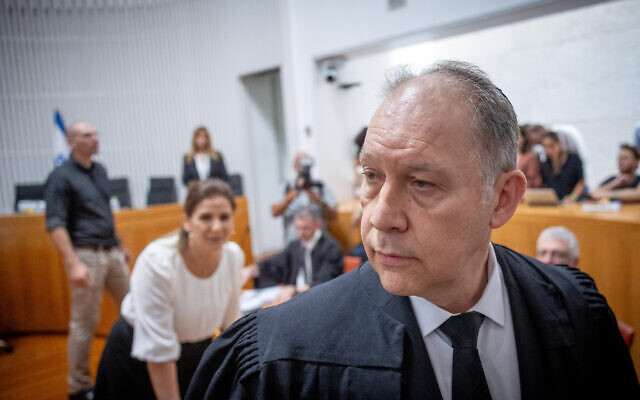
Attorney Ilan Bombach arrives at a court hearing on petitions against the government’s reasonableness law, at the Supreme Court in Jerusalem, September 12, 2023. (Yonatan Sindel/Flash90)
“Because 37 people were authorized to sign the hasty Declaration of Independence, which was still in draft stage until the last moment, this should bind people who came later?” Bombach asked the court, noting that its signatories were unelected, and that it is “unthinkable” to say the document must “bind all future generations.”
After he was rebuked for appearing to downplay the significance of the Declaration of Independence, Bombach said that the people elected the Knesset as a constituent branch of government, which legislates Basic Laws, in addition to its power as a legislative branch, and that the Knesset’s power additionally stems from the people’s votes.
Bombach tried several times to switch the discussion to the reasonableness law itself, calling the question of the Knesset’s source of power a “theoretical, academic” discussion, but the justices pressed on on the matter, pointing out that the government’s argument began by stressing the High Court’s lack of authority to intervene in Basic Laws.
The Yesh Atid party also criticized Bombach for appearing to downplay the importance of the Declaration of Independence. A statement from the opposition party said that “there is no clearer proof that there is an anti-Zionist, anti-Israeli, anti-democratic government in Israel that will burn the pages of history and tarnish the founders of the state, all for despicable political considerations.”
Tuesday’s hearing was one of the most consequential in the country’s history, with the High Court of Justice weighing in on petitions from a range of civil society organizations to strike down the government’s “reasonableness” law, an amendment to Basic Law: The Judiciary, and the first and only part of the coalition’s judicial overhaul agenda to be legislated.
The hearing is essentially a clash over Israel’s proto-constitution, with the petitioners claiming that the law limiting the judiciary’s power to review government decisions violates the country’s democratic underpinnings, while the government argues that Israel’s constitutional arrangement bans the court from intervening in Basic Laws.
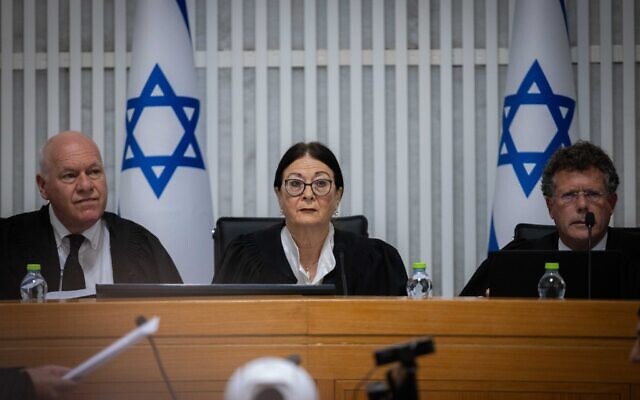
High Court Chief Justice Esther Hayut (center) and justices Isaac Amit (right) and Uzi Vogelman at a court hearing on petitions against the government’s reasonableness law at the Supreme Court in Jerusalem, September 12, 2023. (Yonatan Sindel/Flash90)
The government and its legal representatives were the first to plead before the 15-justice panel, and argued both that the court is subject to the Basic Laws and therefore cannot overturn them, and that the law does not harm Israeli democracy.
Later, the petitioners were slated to argue that the law undermines key guardrails of Israel’s democracy and should therefore be struck down.
The comments and questions the High Court justices make during the hours-long hearing are are seen as sources of insight indicating how they might ultimately rule on the explosive case, which could take weeks or even months.
Supreme Court President Esther Hayut suggested that the newly passed law restricting judicial oversight of government decisions goes against a global trend toward expanding judicial review.
“Here, we are moving toward a trend of canceling [it],” Hayut said, giving England and Australia as examples of countries that have increasingly used the doctrine.
Knesset lawyer Yitzhak Bart replied to Hayut: “We had a big change 40 years ago and since then the pendulum has been swinging,” seemingly referring to the expansion of High Court activism during the judgeship of former Supreme Court chief Aharon Barak in the 1980s — one of the main arguments touted by backers of the government’s judicial overhaul.
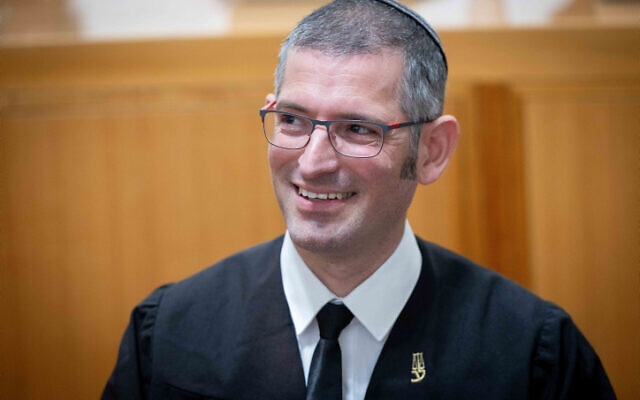
Attorney Yitzhak Bart arrives at a High Court hearing on petitions against the ‘reasonableness’ law, at the Supreme Court in Jerusalem, September 12, 2023. (Yonatan Sindel/Flash90)
The justices also appeared to criticize the rushed passage of the reasonableness law, something opposition figures have long decried.
In response, Bart acknowledged to the court that the legislative process was hurried and had some flaws, but argued that such flaws are nowhere near the threshold that justifies nullifying the law.
“It would have been appropriate for the discussions to go on longer; it would have been appropriate to give an expression to some of the [opposition] remarks at the committee,” Bart admitted.
Justice Yechiel Kasher asked Bart how he could argue that the source for the Knesset’s right to legislate Basic Laws is the Declaration of Independence, while at the same time not viewing as obligatory that same document’s mandating that a full constitution be legislated, which hasn’t happened in 75 years.
Bart argued that the Knesset “didn’t want to exempt the government from the obligation to act with reasonableness; it could have done that through a regular law, but instead it reduced the court’s use of the judicial standard — while not eradicating the obligation to act with reasonableness.”
Multiple justices questioned Bart over how this reconciles with eliminating the justice system’s ability to enforce the reasonableness standard in relation to government and ministerial decisions.
“Who ensures that [ministers] in fact act with reasonableness? You agree that there is a legal obligation, but say that there can be no judge [to enforce it],” Hayut said critically.
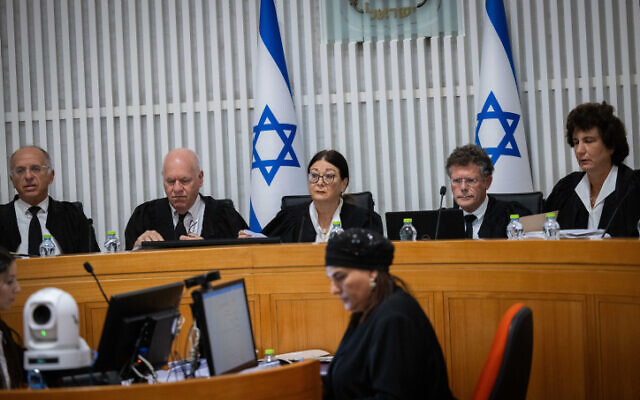
Supreme Court President Esther Hayut and other justices at a High Court hearing on the ‘reasonableness law’ at the Supreme Court in Jerusalem, September 12, 2023. (Yonatan Sindel/Flash90)
Bart also argued that rather than strike down the law, the High Court could use its ability to interpret laws to remedy the vacuum in judicial review over government decisions caused by the legislation. For example, he said, judges could rule that the law does not apply to interim governments, because such governments could abuse the absence of the reasonableness standard.
Hayut questioned such a position, asking on what basis within the text of the reasonableness law the court could make such an interpretation.
“What in the law allows us to differentiate between different types of reasonableness?” she asked. “Are you not inviting us to rewrite the law? If we say it doesn’t apply to interim governments… then we are rewriting the law.”
Bart later continued the argument: “It’s not that the reasonableness standard has been canceled. The precedent of previous decisions for the government to act with reasonableness remains. The attorney general and legal advisers will continue to tell the government when it is acting without reasonableness.”
Justice Ofer Grosskopf interjected: “But there will be no way to enforce it.”
Bart replied that “the idea that the ministers will only listen to the attorney general if [the court] has a sledgehammer [of being able to strike down government decisions through the reasonableness standard] is simplistic.”
To this, Justice Uzi Vogelman told Bart that his “argument is disconnected [from reality]. It’s a very optimistic vision.”
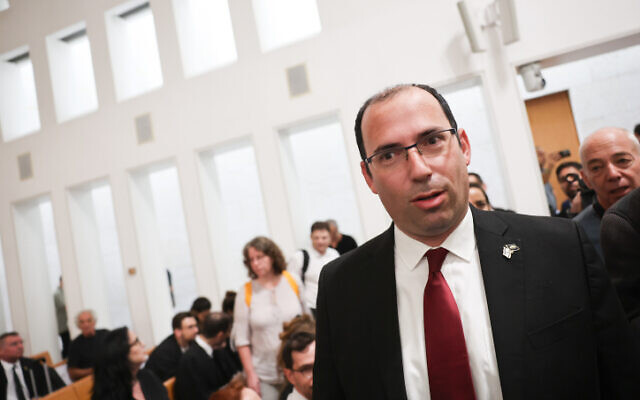
MK Simcha Rothman arrives at a hearing on petitions against the government’s ‘reasonableness law,’ at the Supreme Court in Jerusalem, September 12, 2023. (Yonatan Sindel/FLASH90)
Later, Religious Zionism MK Simcha Rothman, who spearheaded the legislation of the reasonableness law, addressed the justices in his role as chairman of the Knesset Constitution, Law and Justice Committee, also arguing that the court has no right to intervene in the law.
In a tense exchange during which several justices told him he was making political declarations rather than legal arguments, Rothman admonished the court, stating that “a privileged elite [the justices of the High Court] will not be able to protect rights in the long term.”
He also cited comments made by former Supreme Court justice Moshe Landau, implying that the court has become “an oligarchic regime of a [small] group of people.”
“What is the justification to take away the basic characteristic of the State of Israel as a democratic state, its free elections, the ability of the public to express its opinion, the ability of the public to change the laws that run their lives, the ability of the public to determine how the government is run?” Rothman demanded.
Justice Anat Baron challenged him, asking: “What if the Knesset said that elections would take place only every 10 years, or that Arabs do not have the right to vote, or that it is forbidden to travel on Shabbat — what would you say?”
Rothman responded: “If we make a mistake, we can correct it when we are made aware of it, and if we don’t — we can be replaced via the ballot box.”
The crucial High Court hearing comes after more than nine months of sustained, massive protests and fierce opposition to the hardline Netanyahu coalition’s bid to radically overhaul the judiciary, starting with the passage of the reasonableness law, which the government pushed through the Knesset in July.
Political tensions flared ahead of the court hearing, and justice were reportedly issued added protection amid fears of disruptions and protests.
Times of Israel staff contributed to this report.




